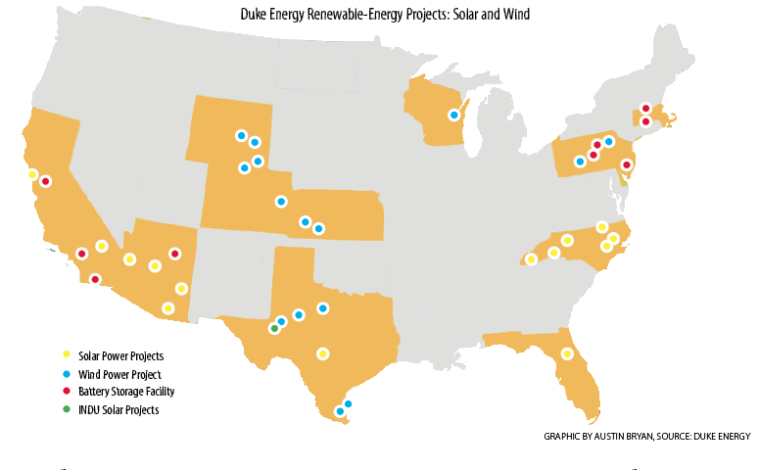Duke Energy has proposed to nearly double its capacity for solar energy in North Carolina by the end of 2015.
The corporation currently has 350 megawatts of solar power from developers which compares to the size of a small power plant, according to Randy Wheeless, communications manager of Duke Energy. With the new proposal, Duke Energy will add an additional 300 megawatts of power by renewable means.
Wheeless said there are a significant number of solar projects being planned already, and they are in various stages of development. Duke Energy is giving its attention toward projects being proposed in order to achieve successful results.
“We know those projects in development have the best chance of being ready by 2015,” Wheeless said.
Wheeless said solar developers will have flexibility in choosing whether they want to bring Duke Energy the solar project and sell the power over a particular period of time or sell the project when it is complete.
“It gives the developers more flexibility on how they want to do it,” Wheeless said. “The bottom line for us is that we want to buy more solar energy or add more on to our system.”
Wheeless said it’s more beneficial for Duke Energy to buy the project from other parties than to build the projects themselves.
Wheeless said Duke Energy is looking for projects larger than normal size because it costs less per kilowatt hour than a smaller solar farm. The solar projects will be larger than five megawatts, which is midsize for a large solar farms.
“Duke Energy has been around for 100 years.” Wheeless said. “Running power plants and buying power plants is just what we do.”
Wheeless said North Carolina’s environmental conditions and tax incentives are beneficial for solar projects. North Carolina is one of the top five states that has the capacity to generate solar power in the nation, according to Wheeless.
The timeline of solar-project plans also aligns with the 2015 expiration date of federal and state tax credit influencing solar developers to build the projects by the deadline, Wheeless said.
According to Wheeless, Duke Energy must generate almost 13 percent of its power using renewable means by 2021. Bringing the new solar energy projects into the system will be instrumental in the company to meet this requirement, Wheeless said.
Solar farms are already housed throughout the state in Eastern North Carolina, Piedmont and west of Charlotte, according to Wheeless. The location of the new solar projects will be based on the bids made by developers and where the most logical place will be to plant them.
Wheeless said the state has done a great job of bringing new solar onto the system while keeping electric rates lower than the national average. Duke Energy’s solar capacity proposal has drawn great interest from developers about their projects, according to Wheeless.
Steve Kalland, executive director of the North Carolina Solar Center, said the solar market has been growing in the state and attributed the success to the state’s policies.
“North Carolina has broken into the upper echelon of solar energy by making good policy decisions that makes the market more attractive to businesses to come to here and do their work,” Kalland said.
Kalland said Duke Energy is putting a seal of approval on solar power as a technology by making it much bigger part of their portfolio.
Kalland said the Raleigh area is lucky to be the home of solar energy. Centennial Campus already plays a significant role in solar energy technology through organizations such as the NSF FREEDM Center and the Solar Center, Kalland said.
“When it comes down to technology driven economic development, there’s nobody better than N.C. State, in particular to those in the College of Engineering, management and other essentials that make companies emerge from the research labs into the private sector,” Kalland said. “That’s how we grow and thrive to become the next RedHat or the next SAS.”
At N.C. State, there’s an increasing interest in the student body in topics of renewable energy and clean technology through the new advanced manufacturing center recently announced by President Obama, the solar center and environmental sciences program, Wheeless said. Students will also get a chance to explore their interests through the sustainability minor and new renewable technology minor that are currently being established.
The solar projects will affect N.C. State by creating job opportunities for students that have the skills. As the job market continues to grow in solar energy field, there will be a high demand for students with those skills in science, technology, research and development.
Kalland said these projects will crosscut the campus, touching a different skill set across campus affecting engineers from the technology side, business majors who figure out the financial models and put the projects together and CHASS majors in public policy advising who make sure the rules are set right.
“N.C. State had a very real hand in getting the business models of larger scale-solar development validated in North Carolina,” Kalland said. “A lot of companies recognize the University for its role in solar energy.”








